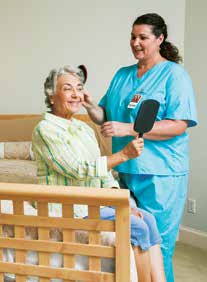 The in-home care business is one of the fastest and largest growing industries nationwide, and the demand for services will continue to grow into the foreseeable future. In fact, over the next 15 years, the entire baby boomer generation will pass the age of 65; consequently, when that occurs, there will be nearly 84 million seniors living in America—nearly onefifth of our national population.
The in-home care business is one of the fastest and largest growing industries nationwide, and the demand for services will continue to grow into the foreseeable future. In fact, over the next 15 years, the entire baby boomer generation will pass the age of 65; consequently, when that occurs, there will be nearly 84 million seniors living in America—nearly onefifth of our national population.
In the last census, about 204,700 people over the age of 65 lived in Hawai‘i. Estimates suggest that nearly 40,000 of the state’s seniors will need some sort of long-term care services by 2030.
With an aging population comes an increasing demand for healthcare, which is why the industry is expected to grow 8 percent over the next four years. This demand will be heightened for those who choose to age in place. The term “aging in place” is relatively new in gerontology and has many meanings. It has been defined as “remaining living at home in the community, with some level of independence.” Aging in place has been shown to have health and emotional benefits over institutional care. Scientific evidence indicates that patients heal more quickly at home, which promotes cost savings. Studies have also shown that the longer elders remain independent from institutional care, the better their overall physical and emotional health remains.
 The success of the increased growth of in-home care services brings its own set of challenges, such as the recent shortage of nurses, physicians, support staff and other practitioners.
The success of the increased growth of in-home care services brings its own set of challenges, such as the recent shortage of nurses, physicians, support staff and other practitioners.
While the number of home healthcare professionals has already tripled over the past 25 years, there is not enough to meet the growing demand for in-home and community-based services. In the case of in-home care services, this means increasing difficulty in finding quality caregivers. Consequently, home care agencies have been forced into fierce competition to hire and pay top wages for the most qualified caregivers. The sparse availability of qualified caregivers has made it critical for in-home care providers to offer flexible schedules to ensure constant field support, while providing continuity to their consumers. The delicate balance between home healthcare professionals, in-home care agencies and consumers is starting to take a toll on the ability to provide services within the community. In fact, many consumers are being turned away for the simple fact that most caregivers are unavailable for the minimal three hour shifts. They are seeking more stable hours, better commuting options, more consistent work hours and an increase in wages.
It is more important than ever to join together as a community to develop programs that support the fields of gerontology and geriatrics and create opportunities to ensure competent healthcare professionals are being utilized across the state.
Stories for and about seniors, events and other topics are always worth sharing, including 100th birthday announcements. Contact Sherry at:
808-722-8487 | SGoyaLLC@aol.com
ALTRES MEDICAL
967 Kapiolani Blvd., Honolulu HI 96814
888-868-1600 | 808-591-4960 | F: 808-591-4915
Melissa.mansfield@altres.com
Altresmedical.com


Leave a Reply